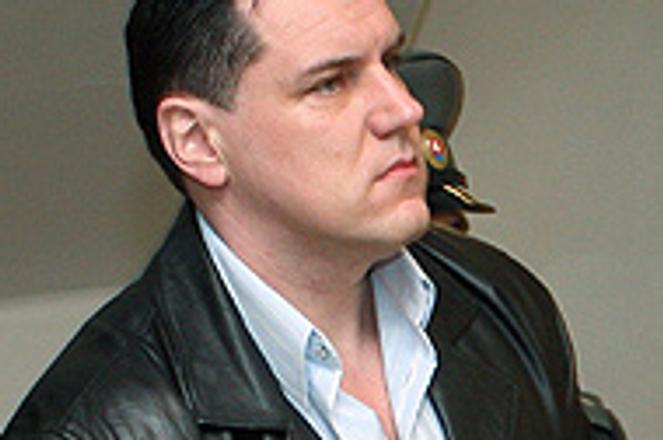Mikuláš Černák is battling for freedom.
photo: ČTK
THE POLICE have begun an investigation of Ľubomír Samuel, the lawyer defending Slovak organized crime boss Mikuláš Černák, for influencing the courts handling his murder cases.
"Ľubomír Samuel was found to have interfered with the independent exercise of the judicial powers of both the Banská Bystrica regional and district courts," said Attorney General's Office spokesperson Jana Tökölyová on January 9.
The police claim to have a letter in which Samuel - the former Banská Bystrica judge who in 2000 found Černák guilty of extortion but innocent of murder - blackmailed Banská Bystrica justice Peter Pulman, who is ruling on Černák's murder case, by threatening to reveal an extramarital affair.
Samuel told The Slovak Spectator that he expected to be charged in the coming days: "It's nonsense, of course. But I'm ready in case they jail me," he said.
On January 11, the Sme daily reported that former Černák accomplice Slavomír Surový testified that Samuel, as a judge, had demanded a Sk2 million bribe from Černák in 2000 for securing the dropping of the original murder charges.
Samuel said he saw no problem in now defending a person he had sentenced as a judge: "I also represented him in other cases than those I decided on as a judge," he told The Slovak Spectator, while also denying he had taken any bribes.
But the Attorney General's Office alleges that Samuel has used his contacts to ensure that all of the judges in Banská Bystrica have been influenced in favour of Černák.
"I'm on a first-name basis with all of them. It's normal, given that I am their former colleague," Samuel said.
"But that's all it is."
The Supreme Court is now deciding whether to reassign the Černák cases to courts in the Prešov region, and to declare the 60 Banská Bystrica justices biased. Until it decides, Černák will remain in custody.
Race for time
Černák, regarded as the boss of the Slovak mafia since the 1997 murder of Miroslav Sýkora in Bratislava, took another step towards being released from pre-trial custody on murder charges on December 21 when the Banská Bystrica district court ruled that he be set free due to mistakes by the police and the prosecution.
Černák, who apart from a short break has been behind bars for murder and extortion since December 1997, benefited from the court's ruling that he could not be tried for murdering Imrich Oláh and Marián Karcel because the Slovak authorities had not asked their Czech counterparts to authorize the charges when he was extradited from the Czech Republic in 2003 after fleeing there.
Under Slovak law, if the authorities wish to press charges against a Slovak citizen facing extradition, they must request explicit consent. The problem in the Černák case is that hey was extradited to face different charges, while the Oláh and Karcel murders were pinned on him later.
The Slovak authorities had requested he be returned to Slovakia after the Supreme Court ruled a lower court had erred in setting him free on parole for extortion.
Gabriel Slobodník, the chief justice of the Banská Bystrica district court, told Markíza TV that Černák's prosecution for murder was "illegal because the agreement of the Czech Republic was not secured."
However, the prosecution disagreed, and AGO spokesperson Tökölyová said that the rules said the agreement of the Czech Republic had to be secured only in the case that the Slovak authorities were requesting his trial on different charges - not, as was the case, that they wanted him returned to complete a previous jail term.
Despite the fact that the prosecution disagreed with the opinion of the Banská Bystrica district court, on December 22 it insured itself by requesting that a European warrant be issued for Černák for the murders of Jozef Filip and Gustáv Slivenský. A Prešov court sent the request to the Czech Republic the next day, and on December 29 the Prague City Court agreed with Černák's prosecution.
The prosecution maintains it made no mistake, and Tökölyová told The Slovak Spectator that the same Banská Bystrica court had decided on October 24, 2006 that the agreement of the Czech Republic was not required. "Less than two months later it issued a diametrically opposite verdict," she said, adding that this violated the principle of legal certainty.
Among other crimes, Černák is accused of murdering Marián Karcel, who acted as a witness against him in another murder case. The police believe that Černák ordered Karcel to be killed from jail; in June 2000 he was cut down by machine gun fire in Banská Bystrica.
Police also believe that Imrich Oláh was one of Černák's accomplices in various violent crimes, until he too was murdered. His remains were found in 2005, after having been brutally murdered in the late 1990s.
Detectives also believe that Černák murdered Jozef Filip on September 22, 1994 because he believed he was a police informer.
Police have tied Černák to the killing of former policeman Slivenský on March 25, 1997 with a knife in the cellar of the Gerlach Hotel in Poprad.
Later, one of Černák's friends allegedly cut off the dead man's head and, on his orders, placed it, covered with his police cap, on the hood of a car parked in a Poprad suburb.


